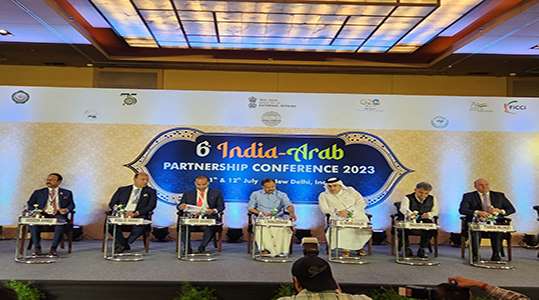The Secretary General of the Union of Arab Chambers, His Excellency Dr. Khaled Hanafi, stressed during a speech he delivered at the work of the sixth session of the Arab-Indian Partnership Conference, which was held in New Delhi, during the period 11-12 July 2023, in the presence of prominent official and economic figures from the Arab and Indian sides. At the forefront of which is the Minister of State for Foreign and Parliamentary Affairs in the Indian government, His Excellency Sharif Muralidharan, and His Excellency the Assistant Secretary-General of the League of Arab States, His Excellency Ambassador Ibrahim Al-Maliki, “The door is open today to the establishment of an Arab-Indian strategic partnership that achieves the two parties’ common interests, and reduces dependence on traditional Arabs over the West in the political, security, and economic fields.”
He stressed, "The partnership between the Arab countries and the Republic of India is an important and essential engine for economic growth that contributes to creating trade and investment opportunities for more than 2 billion people. Joint economic cooperation also contributes to enhancing the vitality of trade and investment flows across the South Asian region and their access to regional and global markets." Emphasizing, "Many Arab countries have forward-looking and ambitious visions to enhance economic openness to the world and build international trade partnerships with strategic markets, hence the importance of supporting the multilateral trading system, as a key driver for achieving sustainable economic development. It also comes as an affirmation of the Arab countries' belief in multilateralism and commitment to creating new opportunities for exporters, manufacturers, and investors."
He stressed the importance of strengthening comprehensive economic partnership agreements between Arab countries and India, which would create an open and non-discriminatory environment for cross-border trade with India, eliminate tariffs on goods, enhance market access for service providers across key and sub-sectors including digital trade and intellectual property rights, in addition to creating jobs."
In his speech, the Secretary-General touched on "the need to seek bilateral trade in a currency other than the dollar, which requires the central banks of Arab countries and the Central Bank of India to work on a way to move forward in facilitating trade in digital currencies, for example. This will reduce the cost of transactions, serve as an additional strengthening of economic relations and further strengthen trade relations."
He considered that "what is required today is to strengthen Arab-Indian cooperation in the information technology sector and the digital economy, as India has made an important leap in this field, in addition to other sectors, the most important of which are energy, agriculture, food industries, and mining. In addition to the importance of access in the implementation of joint projects in infrastructure and logistics. It is equally important to leverage Arab and Indian investments in manufacturing and integrate them into global supply chains to enjoy long-term and robust cooperation based on a win-win partnership. The vital focus should also be on future-oriented entrepreneurial collaboration in innovation, start-ups, e-commerce, hospitality, and other things that can benefit from higher value-added growth in India-Arab economic relations."
He concluded by saying, "We need to strengthen and deepen economic ties and institutionalize long-term cooperation, and the newly established Indo-Arab Council is a milestone in this direction. We also aspire to activate the role of the Arab-Indian Chamber, whose establishment negotiations have taken an important path. But we need more coordination and consultations in the next phase in order to form the Chamber's Board of Directors from the Arab and Indian sides so that it can play its essential role that we rely on to upgrade joint relations in the near future."
Source (Union of Arab Chambers)

